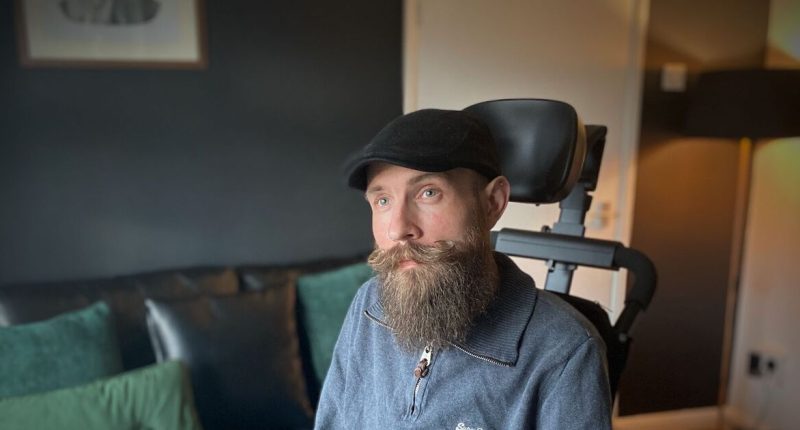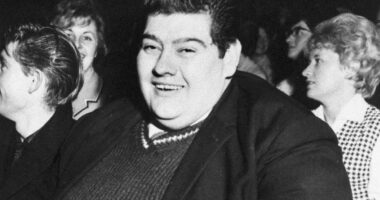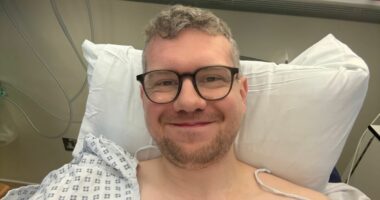Share this @internewscast.com
Ryan Swanepoel was running with friends one day when he suddenly noticed something. It was the first sign of a condition that would change his life.
Ryan suffers from limb-girdle muscular dystrophy (LGMD), a rare genetic condition that progressively weakens his muscles, primarily around his shoulders and hips. He has shared his story with us in a bid to urge other people with chronic pain to stop suffering in silence.
The 40-year-old Buckinghamshire man said: “My symptoms started in my early twenties when I was with a group of friends, and it was one of those random moments where it started raining. As a group we thought: ‘We’re not too far from home. Let’s just run.’
“I noticed that I wasn’t moving as quickly as them. It almost felt like my legs were full of concrete, it was quite a strange feeling. I went to see my local GP.” At the age of 23, he was the first in his family to be diagnosed with the rare genetic disorder, which he knew nothing about at the time.
He said: “It just came completely out of the blue but it was fascinating because it’s from the genes of the parents. It’s basically luck of the draw whether you get the faulty gene from both mother and father.
“There was no family history. I was the first to get diagnosed but I had an older brother who was absolutely physically normal but he later got affected quite rapidly. It’s quite unusual that we’ve both got it and had been affected so differently.”
As for the friends he had been running with when the signs first appeared, Ryan found his circle getting smaller throughout his twenties. He said: “I was trying to fit in. They didn’t realise I was struggling. The places we would meet had to be accessible but I didn’t want to change the plans and I also think they didn’t want to bother me. It was almost like an invisible barrier.”
Recent research from Curaleaf shows Ryan’s experience is not unique, with four out of every five people suffering from chronic pain feeling obliged to hide it. While there is no cure for muscular dystrophy, Ryan is encouraging other patients to voice their needs to live life to the fullest.
He said: “You don’t need to suffer with the silent pain. There are treatments that can change you for the better. Seek the information and talk to others with it to get the ins and outs.”
Ryan was determined not to let his condition derail his life. He said: “My mother does hold guilt, and that’s something that I don’t like her feeling, but as a parent, I could understand that feeling. My outlook on it is you can’t help what you’re given. You have to just go with it.” He did not want to give up in any way, he said.
“I did quite the opposite and carried on working until recently. Remaining upbeat, carrying on and in doing that spreading awareness. It’s almost helped my mum see that it hasn’t stopped me, and it kind of helps her guilt, I find, in doing things like this.”
Ryan, who now lives with his second wife and six children, said he saw his mobility rapidly deteriorate following a workplace accident six years ago. He recalled: “At the time, I was using two crutches and I was in the computer room with all those office-style chairs on wheels. As I was walking behind, a student just moved it out and my crutch clipped one of the wheels. I’d fallen on that leg of another chair.”
The fall resulted in a broken femur and hip, and although he hasn’t fully recovered to the point of walking again, he has managed to get back into the driver’s seat, proving the doctors wrong. His wife has since left her job to become his full-time carer.
He added: “There’s no timescale. Every patient I speak to is different. Different ages, some are more mobile than others.”
However, aside from losing his mobility, the real impact the condition has had on Ryan has been the fatigue and pain. Initially, he was prescribed strong doses of Tramadol to manage the pain, but this led to a range of side effects from constipation to sleeping problems and personality changes. He said: “I used to be quite an upbeat person, and it almost changed me into quite a solemn, numbed character. Coming off them was harder than actually being on them.”
Working in childcare and having his own children to care for made the side effects traditional medicine was causing difficult to handle. He sought alternatives – and then a friend suggested cannabis [now legal for medical purposes in the UK and prescribed by an official recognised specialist doctor]. Despite providing some relief, Ryan had been raised in an anti-drug household and said it “wasn’t a nice feeling – and the stigma that came with it and everything else”.
When medical cannabis became legal in the UK in 2018, Ryan discovered Curaleaf shortly afterwards and was able to start receiving treatment for his pain that was not only legal but also customised to his needs. He added: “The options that were available through the clinic were something that wasn’t ever available for me through other sources.
“I’d be able to get a lower dose suitable for daytime use, oils for long term use, CBD to help with my muscle spasticity. The feeling of not breaking the law and having access to medication that I know works for me – it’s been an absolute game changer.”
The former teacher also discussed it with his boss first, who said that it wouldn’t impact his work. He said: “If anything, it helped me work. I didn’t have to mask my pain, it was incredibly exhausting and obviously having a muscle wasting condition when you’re physically exhausted isn’t good either. It left my mind free to focus on normal things – not have it clouded by pain and anxiety all the time.”














